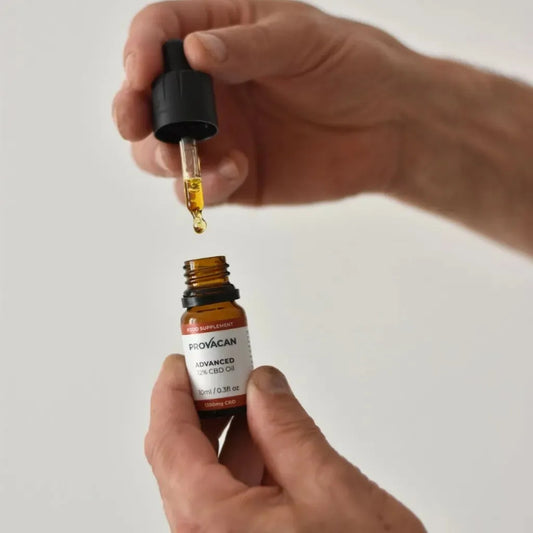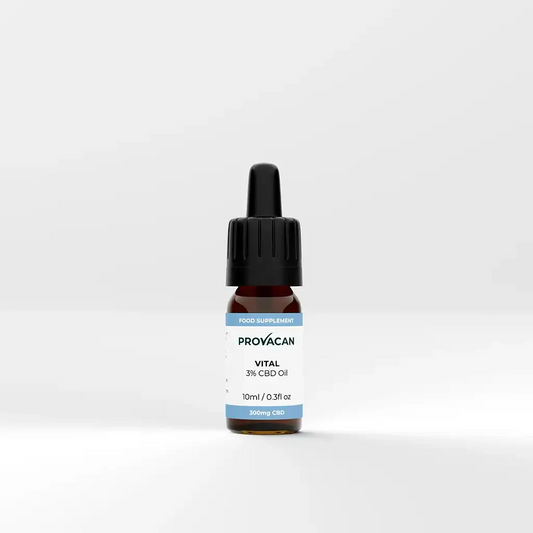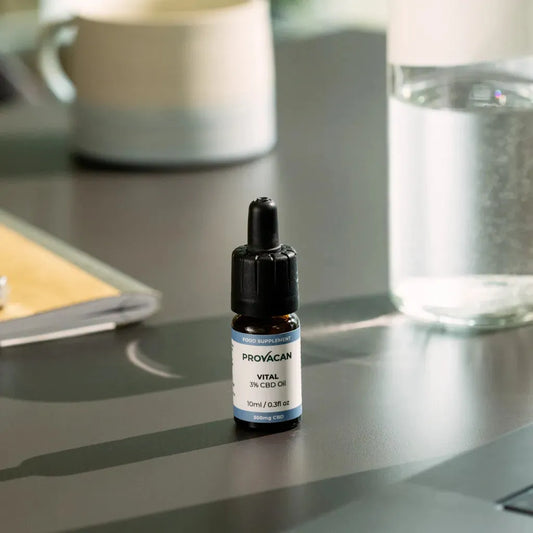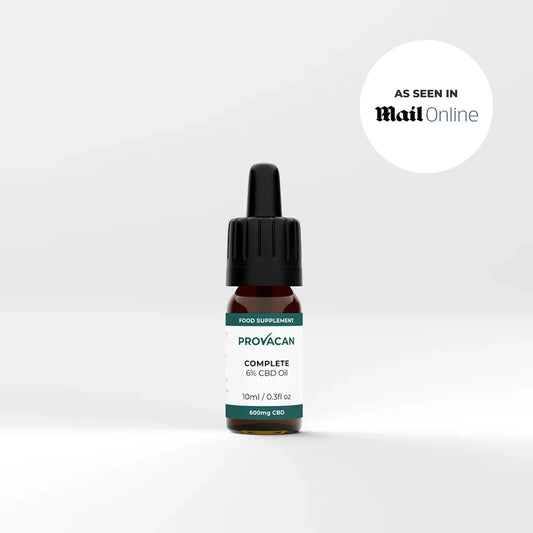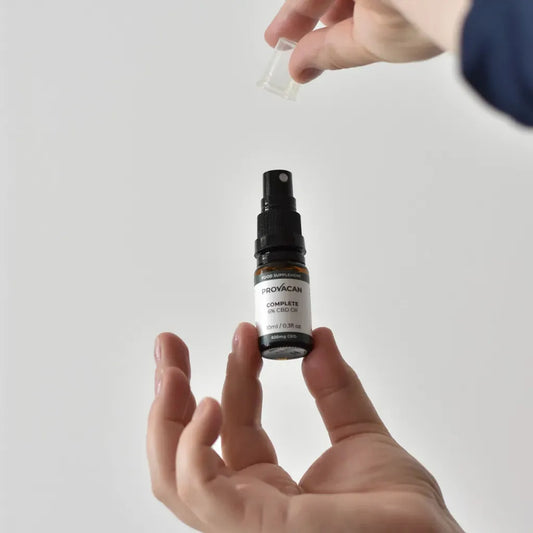Key Takeaways:
- CBD Oil Can Provide Significant Health Benefits: From pain relief to anxiety reduction, CBD oil is celebrated for its therapeutic potential, supported by scientific research.
- Possible Side Effects Are Generally Mild but Worth Noting: Side effects like fatigue, changes in appetite, and gastrointestinal issues can occur, highlighting the need for responsible and informed use.
- Legal and Safe Use Requires Awareness and Quality Products: Ensuring compliance with local laws and choosing reputable sources like Provacan are crucial for safe and effective CBD oil use.
As the spotlight on wellness intensifies, CBD oil has surged in popularity, acclaimed for its potential health benefits including pain relief, reduced anxiety, and improved sleep. However, like any supplement, it's essential to consider the full spectrum of effects, including potential side effects. In our quest for enhanced personal health, understanding these implications is just as crucial as recognising the benefits.
At Provacan, we are committed to your wellbeing, ensuring that our customers are well-informed about all aspects of CBD use. This article endeavours to provide a comprehensive look at the possible side effects of CBD oil, substantiated by scientific research, to ensure you can make a well-informed decision about incorporating CBD oil into your health regimen. Whether you’re a seasoned CBD user or new to its potential, staying informed is key to optimising your health outcomes with confidence and safety.
CBD Origins And Common Uses
Cannabidiol, commonly known as CBD, is a compound sourced from the Cannabis sativa plant. Unlike its counterpart tetrahydrocannabinol (THC), CBD is non-psychoactive, meaning it does not produce the "high" associated with cannabis use. This distinction has made CBD an appealing option for individuals looking for relief from various symptoms without the mind-altering effects of marijuana or certain pharmaceutical drugs.
CBD oil is extracted from the hemp strain of the Cannabis sativa plant, which contains high levels of CBD and low levels of THC. The legal threshold for THC in CBD products is less than 0.2% in the UK, ensuring they do not induce psychoactive effects. Provacan upholds these standards by employing superior extraction methods that maximise the purity and potency of CBD while strictly adhering to regulatory requirements.
The common uses of CBD are vast and varied. Research and anecdotal evidence suggest that CBD may provide relief from anxiety, depression, and stress. It's also commonly used to address physical conditions such as chronic pain, inflammation, and arthritis. Furthermore, emerging studies indicate possible benefits in sleep management, enhancing skin health, and even reducing symptoms of neurological disorders.
Potential Health Benefits Of CBD Oil
CBD oil has been hailed for its numerous health benefits, which are supported by a growing body of scientific research. Some of the main potential benefits of CBD oil include:
- Chronic Pain Relief: CBD interacts with the endocannabinoid system to reduce inflammation and the perception of pain. Useful for conditions such as arthritis and multiple sclerosis.
- Mental Health Improvement: CBD may have a calming effect on the nervous system. Helps in reducing symptoms of anxiety and depression without psychoactive effects.
- Cardiovascular Health: May help in lowering blood pressure and reducing inflammation. Potential to decrease the risk of heart-related illnesses.
- Neurodegenerative Disease Prevention: Antioxidant properties help combat oxidative stress and deterioration. Supports brain and nervous system health.
- Sleep Quality Enhancement: Promotes relaxation and modulates sleep patterns. Leads to better sleep quality and duration, crucial for overall wellbeing.
As research continues to advance, the potential therapeutic applications of CBD oil expand, offering hopeful prospects for various health conditions. However, while the benefits are promising, it is crucial for consumers to use CBD oil responsibly and choose high-quality products from reputable sources like Provacan, which prioritises purity, potency, and safety in all its CBD offerings.
Common Physical Side Effects
When incorporating CBD oil into your wellness routine, it's important to be aware of potential physical side effects, although these tend to be mild and temporary. Here are some common physical reactions to be mindful of:
- Fatigue: Some individuals report feeling unusually tired or lethargic after using CBD oil. This can often be managed by adjusting dosages or timing of consumption.
- Changes in Appetite: CBD oil might influence your eating patterns. While some experience increased appetite, others might notice a decrease.
- Gastrointestinal Issues: Nausea, diarrhoea, and upset stomach are possible side effects, especially when taken in large doses or on an empty stomach.
- Dry Mouth: Also known as "cottonmouth," this condition occurs because CBD can reduce saliva production. Staying hydrated can help alleviate this discomfort.
- Dizziness: Particularly when standing up quickly, some users might feel lightheaded or dizzy after taking CBD oil. This usually passes quickly and can be alleviated by taking the product with food.
Remember, everyone’s body reacts differently, and these side effects may not occur in all users. Starting with a low dose and gradually increasing it can help minimise potential discomforts. If you experience persistent side effects, it is prudent to consult a healthcare professional.
Psychological Reactions To CBD Oil
While CBD oil is renowned for its calming effects, potential psychological side effects should not be overlooked. In some individuals, the use of CBD oil may lead to changes in mood and cognition. Common psychological reactions include increased anxiety, mood swings, and a rare but possible feeling of irritability.
It is essential to understand that the psychological impact of CBD oil can vary widely among individuals. Factors such as dosage, the concentration of CBD, and the method of consumption play critical roles in how one might react to CBD oil. For instance, higher doses of CBD have been linked to increased reports of sedation which can impact an individual's alertness during the day.
Moreover, interactions with existing medications or health conditions can also alter the psychological effects of CBD oil. Therefore, it is advisable for users to consult healthcare professionals before integrating CBD oil into their wellness regime, especially if they are currently undergoing treatment for psychological conditions.
Dosing Concerns: How Much Is Too Much?
The appropriate dose of CBD oil can vary significantly depending on factors such as body weight, the condition being treated, and individual body chemistry. Starting with a low dosage and gradually increasing it while monitoring the effects is the recommended approach to find the dose that works best for you.
Most experts suggest starting with a small dose — often between 20-40 mg per day — and slowly increasing by 5mg after a week. This cautious progression allows users to gauge their body's reaction to the compound. Keeping a diary or note of dosages and reactions can be helpful in determining the most effective and safe amount.
Overdosing on CBD is not typically associated with severe risks, but taking more than necessary can lead to discomfort and diminish its intended effects. Common reported side effects from excessive CBD include drowsiness, diarrhoea, changes in appetite, and mood fluctuation.
Studies On Long-Term Use
Exploring the long-term side effects of CBD oil is pivotal, especially for those incorporating it into their daily wellness routine. Current research into the long-term consumption of CBD oil remains in its infancy, with more extensive studies required to provide a comprehensive understanding. However, preliminary studies and anecdotal evidence suggest that regular, prolonged use of CBD oil is generally well-tolerated by most individuals.
Several studies have indicated that CBD oil may have a favourable safety profile over long periods. For instance, a 2017 review published in the journal Cannabis and Cannabinoid Research highlighted that CBD does not alter physiological parameters like heart rate, blood pressure, or body temperature and does not affect psychological functions. That being said, the review also calls for more detailed studies to monitor the effects of chronic CBD usage on hormones, the immune system, and cell viability.
Moreover, the potential interaction of CBD with other medications over the long term warrants caution. CBD is known to inhibit the cytochrome P450 enzymes, which are responsible for metabolising many pharmaceuticals. Thus, if you are taking medication, it is crucial to consult healthcare professionals before starting or continuing CBD use.
Legal Considerations Of Using CBD Oil
When incorporating CBD oil into your wellness regimen, understanding the legal landscape is crucial. In the UK, CBD products are legal as long as they contain less than 0.2% THC (the psychoactive component found in cannabis). This compliance ensures they do not have psychoactive effects.
The regulation of CBD oil falls under the Food Standards Agency (FSA) in the UK. The FSA classifies CBD products as food supplements, which mandates that they meet strict safety and quality standards before being marketed. For consumers, this means ensuring that you purchase CBD oil from reputable sources like Provacan, which adheres to these legal standards and offers transparent product labelling and third-party testing results.
It is also important to note that while CBD oil is legal in the UK and many other parts of the world, laws can vary dramatically from one region to another. For example, some US states have specific regulations regarding the permissible uses and sale of CBD products. Therefore, if you're travelling or purchasing CBD products from international sources, be sure to familiarise yourself with the local laws to remain compliant.
Final Thoughts
While the potential health benefits of CBD oil are significant, awareness of possible side effects is crucial for anyone considering its use. Side effects such as fatigue, changes in appetite, and gastrointestinal issues, although typically mild, underscore the importance of moderation and guided usage. By staying informed and vigilant about how your body responds to CBD oil, you can make the most of its benefits while minimising any adverse effects.
At Provacan, we prioritise your wellbeing by offering CBD products that are not only derived from high-quality sources but also backed by rigorous scientific research. Our commitment to excellence ensures that each product we offer meets strict quality benchmarks, helping you to incorporate CBD into your lifestyle safely and effectively. With the right precautions and by choosing a trusted, research-oriented brand like Provacan, you can navigate the world of CBD with confidence and care.
Read also:
Frequently Asked Questions on CBD Oil Side Effects
What are the common side effects of CBD oil?
While CBD oil is generally well-tolerated, some individuals may experience mild side effects such as dry mouth, diarrhoea, reduced appetite, drowsiness, and fatigue. It’s important to start with a low dose and monitor your body's response.
Can CBD oil interact with medications?
Yes, CBD oil can interact with certain medications, such as blood thinners, antidepressants, and immune suppressants, by affecting how the body metabolises these drugs. Consult your healthcare provider before starting CBD oil if you are on other medications.
Is CBD oil safe for pregnant or nursing women?
The effects of CBD oil on pregnant or nursing women have not been sufficiently researched. Therefore, it is recommended to avoid use during pregnancy and lactation to safeguard the health of both mother and child.
Can CBD oil cause dizziness or lightheadedness?
One of the potential side effects of CBD oil is dizziness or lightheadedness, which typically occurs as a response to lower blood pressure. It’s advisable to sit or lie down until the sensation passes.
How does CBD oil affect liver function?
High doses of CBD oil may pose risks to liver function by causing an elevation in liver enzymes. If you have liver disease or are using other medications that affect the liver, consult your healthcare practitioner before use.
Can CBD oil lead to changes in appetite or weight?
CBD oil may alter appetite. Some users report increased appetite, while others experience a decrease. Changes in weight can occur as a consequence of altered eating patterns.
Does CBD oil cause fatigue?
While CBD is renowned for its relaxing effects, in some individuals, it can lead to feelings of fatigue or extreme tiredness, particularly in high doses. Adjusting the dosage can help mitigate this effect.
Are there any risks of allergic reactions to CBD oil?
Allergic reactions to CBD oil are rare but can occur, particularly if the product contains contaminants or if an individual is allergic to cannabis derivatives. Symptoms may include rash, hives, and itching. If an allergic reaction is suspected, stop use immediately and consult a doctor.
How does hypothetical CBD oil impact mood and behaviour?
CBD oil is often used for its potential to alleviate anxiety and promote a sense of calm. However, some individuals may experience mood alterations such as irritability or agitation. Monitoring your response to CBD and adjusting the dose accordingly can help manage these effects.
Can CBD oil cause dry mouth?
Yes, dry mouth or "cottonmouth" is a common side effect associated with CBD oil. This occurs due to CBD’s influence on the salivary glands, resulting in reduced saliva production. Drinking ample water throughout the day can help alleviate this discomfort.
Sources:
- Iffland, K., & Grotenhermen, F. (2017). An update on safety and side effects of cannabidiol: A review of clinical data and relevant animal studies. Cannabis and Cannabinoid Research, 2(1), 139-154. https://www.liebertpub.com/doi/10.1089/can.2016.0034
- Gaston, T. E., Bebin, E. M., Cutter, G. R., Liu, Y., Szaflarski, J. P., & the UAB CBD Program. (2017). Interactions between cannabidiol and commonly used antiepileptic drugs. Epilepsia, 58(9), 1586-1592. https://onlinelibrary.wiley.com/doi/10.1111/epi.13852
- Crippa, J. A. S., Derenusson, G. N., Ferrari, T. B., Wichert-Ana, L., Duran, F. L. S., Martin-Santos, R., Simões, M. V., Bhattacharyya, S., Fusar-Poli, P., Atakan, Z., Filho, A. S., Freitas-Ferrari, M. C., McGuire, P. K., Zuardi, A. W., & Hallak, J. E. (2011). Neural basis of anxiolytic effects of cannabidiol (CBD) in generalized social anxiety disorder: A preliminary report. Journal of Psychopharmacology, 25(1), 121-130. https://journals.sagepub.com/doi/10.1177/0269881110379283
- Millar, S. A., Stone, N. L., Yates, A. S., & O’Sullivan, S. E. (2018). A systematic review on the pharmacokinetics of cannabidiol in humans. Frontiers in Pharmacology, 9, 1365. https://www.frontiersin.org/journals/pharmacology/articles/10.3389/fphar.2018.01365/full
- Perucca, E. (2017). Cannabinoids in the treatment of epilepsy: Hard evidence at last? Journal of Epilepsy Research, 7(2), 61-76. https://www.j-epilepsy.org/journal/view.php?doi=10.14581/jer.17012
- Bergamaschi, M. M., Queiroz, R. H. C., Chagas, M. H. N., de Oliveira, D. C. G., De Martinis, B. S., Kapczinski, F., Quevedo, J., Roesler, R., Schröder, N., Nardi, A. E., Martín-Santos, R., Hallak, J. E. C., Zuardi, A. W., & Crippa, J. A. S. (2011). Cannabidiol reduces the anxiety induced by simulated public speaking in treatment-naïve social phobia patients. Neuropsychopharmacology, 36(6), 1219-1226. https://www.nature.com/articles/npp20116





